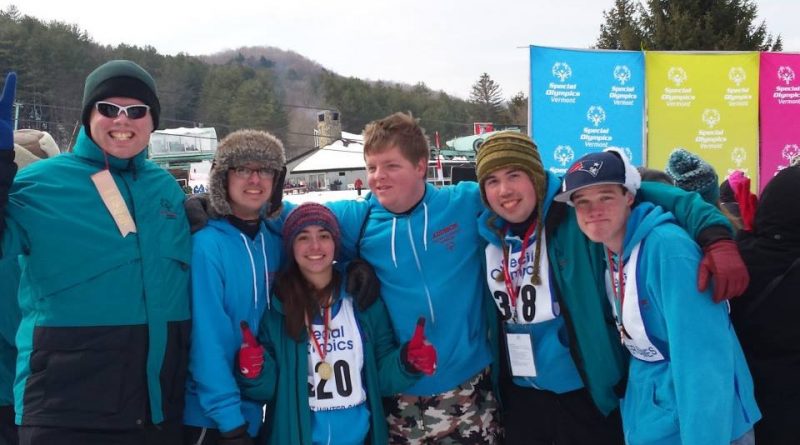The New Winter Games
This March, Pico plays host to a different Winter Games as Special Olympics celebrates 50 years and a new approach.
Sean Fahey was 16 years old when he first tried snowshoeing. He had just moved to Middlebury Vt. from Baltimore, Md., and his new high school friends suggested that he join Special Olympics Vermont.
“All of my friends recommended it,” he said. “It took a little while, but later on I realized that we treat each other like family.”
Fahey, now 25, is part of Addison County’s Special Olympic chapter. With the Winter Games approaching on March 18, he’s spent a lot of time training on snowshoes at Rikert Nordic Center in Ripton. There’s a lot at stake: His relay team has won gold five years in a row, and this year, he plans to make it six.
“If you really want to see the Addison County crew go for it, just wait ‘til Winter Games, and wait until the relay race starts,” he said.
The Games are comprised of two full days of competition. They begin, just like the Olympic Games, with an opening ceremony. Athletes race in alpine and cross-country skiing, snowboarding and snowshoeing events. The weekend is complete with podiums, medals, and a dinner/dance at the Killington Grand Hotel with coaches and staff. The experience impacts everyone—the coaches, athletes and volunteers become, as Fahey says, a family.
“I think one of the principles that Special Olympics really pushes is sportsmanship,” says Liza Reed, marketing director at Special Olympics Vermont. “You see a lot of great sportsmanship out on the field that you might not see at a traditional sports setting. It’s really a family. The day after the dance ends, we’ll have people asking, ‘What’s the dance theme for the Winter Games dance next year?’ People really get hooked.”
This year marks the 50-year anniversary for Special Olympics, and the 47th year of Special Olympics Vermont. In June of 1962, Eunice Kennedy Shriver, John F. Kennedy’s sister, turned her Maryland backyard into a summer camp for children with intellectual disabilities.
She was bothered by the way the public treated the children and concerned that they didn’t have a safe and inclusive place to play. Through the next four years, she spearheaded the first large-scale athletic event for people with intellectual disabilities, held on July 2, 1968, in Chicago.
Now, 50 years later, Special Olympics has gone international with 4.9 million athletes worldwide. And in Vermont, it’s growing faster than ever.
“We started out as a sports organization for people with intellectual disabilities,” Reed says. “Now it’s really a movement for inclusion, and we have a huge focus on Unified Sports—teams where people of all intellectual abilities play together.”
SOV now has more than 1,300 participating athletes. In October, 2017, former-gubernatorial candidate Sue Minter took over as CEO and Executive Director. With twelve years of executive and legislative experience, thirteen years of coaching youth sports, and a lifetime of participating in competitive athletics, her ideas suited the Special Olympics mission: to change the world through sport.
Chiefly, Minter plans to grow year-round participation in the organization’s 13 sports, but she’s also committed to building the health program, which offers health exams and information to athletes at no charge, and the Young Athletes program, which focuses on children of all abilities from ages two to seven.
The organization has also relocated its Winter and Summer Games to accommodate for fast-moving growth—from Suicide Six, the event’s host for ten years, to Pico Mountain.
Pico is also the home of Special Olympics partner Vermont Adaptive, an organization that also strives to empower athletes of all abilities. Reed says the move made sense, and they simply needed more space.
“The Woodstock community was amazing. They really embraced us,” Minter says. “But our athlete numbers just outgrew the space that they have there.”
Part of that growth, she says, comes from the school-based Unified Champions Program, in which athletes of all abilities play on teams together. There are 72 participating schools in Vermont.
Of those, 16 are endorsed by the Board of Public Education, which allows athletes to join a Unified team, in the same way that they would join a varsity or JV team.
“It’s a really cool way of bringing people together and creating a sense of inclusion, and giving all people opportunities to compete in sports,” Reed said. “They get uniforms, they get gym time, and they get referees, and they’re treated the same way as the varsity and JV teams would be.”
When athletes graduate from high school, they often join Unified teams in their communities. SOV saw 450 Unified partners (people who play on Unified teams, but don’t have an intellectual disability) participate in 2017.
For those looking for other ways to get involved, the organization needs volunteers to help out at the Winter Games. Shifts range from several hours to an all-day affair, during which volunteers get to be on their skis or snowboards, on the mountain and meeting athletes.
“When you’re from part of a population that’s been marginalized, or you spend a lot of your life on the sidelines feeling like you can’t do things and people are always talking about your disability, sports are great way to show your ability,” Reed says. “To say, ‘regardless whatever challenges I may be experiencing, I can still be a successful alpine skier, I can be a really successful competitor, I can set goals, I can still be strong and successful.”
To sign up to volunteer, or to find a Unified team near you, visit specialolympicsvermont.com.
Top photo: Sean Fahey, fourth from left, a Special Olympics athlete from Addison County, poses with his winning snowshoe team during last year’s Winter Games. Photo courtesy Sean Fahey

